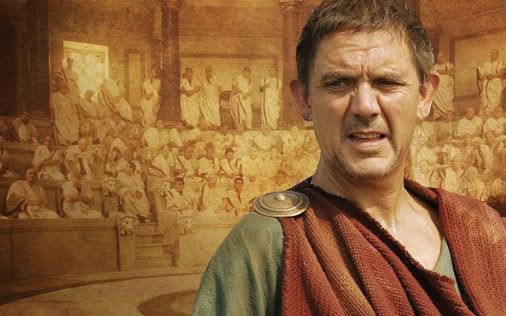John Murrell's Cicero and the Roman Republic is published by Cambridge University Press as part of "a series targeted at either advanced high school or undergraduate students," according to the review in CJ-Online. (Go here, click on Murrell to open the PDF.)
The reviewer, Jonathan Zarecki, has favorable comments about the book but flinches at some of the discussion questions Murrell tosses the student readers:
… I often felt that the questions diverted attention from Cicero and the fall of the Republic and made the book seem as if it were more concerned with modern civics. A few examples:I too have some study questions for students of Murrell's book, which Cambridge University Press is hereby given permission to include in the next edition, gratis.
“There are societies or countries which do not use the adversarial system. How is justice administered in such places?” (in a discussion of Verres’ trial); “In modern states what views do governments and political parties have about poverty and the ways to eliminate it?” (in the chapter devoted to the Catilinarian Conspiracy, after Cicero’s list of the five categories of Catiline’s followers given at Cat. 2.17–23).
Furthermore, at several points M. [Murrell] makes comments or presents questions that may not sit well with an American audience and that may require deft maneuvering on the instructor’s part to keep the class discussion both cordial and on-topic. For example, on p. 42, M. calls the contemporary United States an imperialist state; whatever truth this statement may contain, it could be easily construed as polemical by some students. The second question on p.91 asks students to think about modern examples of “politicians obstinately sticking to their principles when a more flexible stance might have helped the state”; I do not think that it is much of a stretch to think that the immediate response may involve President George W. Bush and his policies."
1. Is John Murrell really interested in Cicero, or is his priority contemporary political indoctrination?
2. Give several examples of societies that "do not use an adversarial system" to administer justice. The Stalinist Soviet Union? Jihadist cells? How is "justice" dealt out in such "societies"?
3. What views do you think the author has about "poverty and the ways to eliminate it"? Why is he asking you this question when his supposed subject is Cicero, who lived in the first century B.C.?
4. What does calling the United States "an imperialist state" have to do with Cicero? Is Murrell trying to sneak his politics in under the guise of teaching history?
5. Can you think of a modern example of a historian who obstinately sticks to his worldview when a more flexible stance might help the state?
6. What principles do many academics hold? Do they distrust individuals? Do they want to extend the power of government over every aspect of life?
7. What evidence do they have that governments solve problems? What evidence, on the contrary, is there that governments are composed of drones looking out for themselves, and creating more mischief than solutions?
8. Why are academics so fearful of open inquiry, so determined to force their ideologies on students over whom they have the power of the grade?
Cicero, if he were to consider the modern version of academia, would undoubtedly have some answers for us. Possibly they would not be flattering to the Cambridge University Press, or to John Murrell.



No comments:
Post a Comment